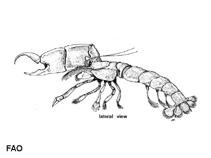Trypaea australiensis Dana, 1852
Australian ghost shrimp| Native range | All suitable habitat | Point map | Year 2050 |

|
| This map was computer-generated and has not yet been reviewed. |
| Trypaea australiensis AquaMaps Data sources: GBIF OBIS |
Classification / Names Populärnamn | synonymer | CoL | ITIS | WoRMS
Malacostraca | Decapoda | Callianassidae
Environment: milieu / climate zone / djupintervall / distribution range Ekologi
; brackvatten. Subtropical; 18°S - 40°S, 144°E - 154°E (Ref. 4)
Distribution Länder | FAO områden | Ekosystem | Förekomster | Utplanteringar
Indo-West Pacific: Australia.
Length at first maturity / Size / Weight / Age
Könsmognad: Lm ? range ? - ? cmCommon length : 6.0 cm TL hane/ej könsbestämd; (Ref. 4); rapporterad maxålder: 2.00 år (Ref. 2823)
Short description Morfologi
Life cycle and mating behavior Könsmognad | Reproduktion | Lek | Eggs | Fecundity | Larvae
Main reference
referenser | Koordinator | Medarbetare
Holthuis, L.B. 1991 FAO Species Catalogue. Vol. 13. Marine lobsters of the world. An annotated and illustrated catalogue of species of interest to fisheries known to date. FAO Fish. Synop. 125(13):292p. Rome: FAO. (Ref. 4)
IUCN Red List Status
(Ref. 130435: Version 2025-1)
CITES status (Ref. 108899)
CMS (Ref. 116361)
Threat to humans
Human uses
Bete: usually
| FishSource |
Verktyg
Ytterligare information
Max. ages / sizes
Length-weight rel.
Length-length rel.
Length-frequencies
Mass conversion
Abundans
Internet-källor
BHL | BOLD Systems | CISTI | DiscoverLife | FAO(Publication : search) | Fishipedia | GenBank (genome, nucleotide) | GloBI | Gomexsi | Google Books | Google Scholar | Google | PubMed | Tree of Life | Wikipedia (Go, sök) | Zoological Record



